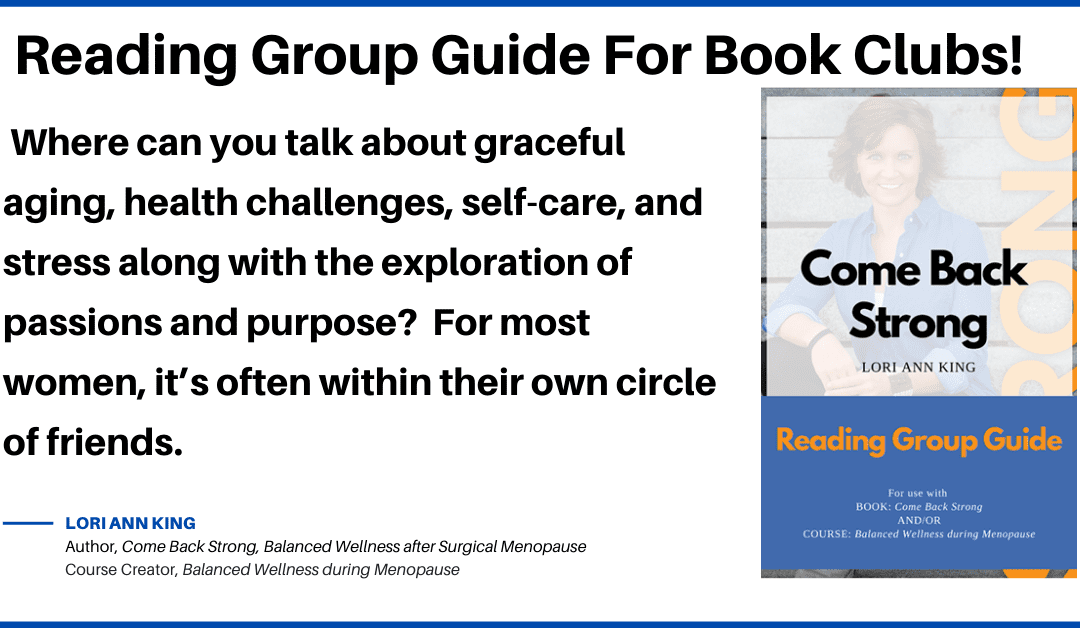Come Back Strong for Book Clubs, Women’s Groups, or Virtual Events.
Women can support each other, celebrate victories, and share struggles. They can be powerful collaborators. Yet, we often choose to go it alone, stuffing our pain and hiding life’s challenges.
It doesn’t have to be that way. We don’t have to fly solo. We can be a team player and help others while we also help ourselves. We can surround ourselves with inspiring women.
We can choose to be stronger together. To help each other through the tough times and to spread joy by sharing and celebrating the good stuff of life.
Women Collaborators are Empowered
That’s why I created the Reading Group Guide to go with my book, Come Back Strong, and/or my bite-size course, Balanced Wellness. Chapter by chapter, it dives deep into questions that will empower women to connect on a deeper level as they uncover universal truths and common themes centered around hormone health, self-care, and other challenges women face.
Here is a glimpse of some of the questions you’ll find in my Reading Group Guide:
-
- Have you struggled hormonally throughout your life with PMS, fibroids, endometriosis, cramping, and heavy bleeding? How has it disrupted the quality of your life?
- “Menopause intensifies things that are out of balance. If a woman is struggling with her weight, finances, career, purpose, another illness, passion, focus, or drive, (surgical) menopause will make each of these issues more obvious and extreme.” Do you agree? Why or why not? Give an example.
- What is one way that women can be more supportive of each other?
- Have your emotions ever caused you to lash out at someone? How did it make you feel? Did it cause lasting damage to you or someone else?
- Take a few minutes to think about stressful things in your life. Can you see where a cumulative build-up of stress is affecting your life? How?
- What’s your experience with anxiety or depression (example: personally struggled, know someone, learning about it)?
- Think of a time you enjoyed being physically active. What were you doing, and who were you with?
- Can you list examples of women in midlife and beyond who are doing remarkable things? What do you admire most about them?
- When your life has a purpose, you have unlimited energy and joy. What excites you about your life? What aspects of your life steal your joy?
- What is something you are passionate about?
The Come Back Strong Reading Group Guide is the perfect fit for your book club, women’s group, or virtual event. Where can you talk about graceful aging, health challenges, self-care, stress, and exploring passions and purpose? For most women, it’s often within their own circle of friends.
Women Leaders: If you are reading Come Back Strong with your book club, don’t hesitate to get in touch with me with the date, time, and Zoom link for your book club meeting because I want to crash into some of them!
Women Collaborators: This Book Club Reading Guide is Made For You!
- Women Entrepreneurs
- Women Leaders and their Team Players
- Health Care Providers and Health Educators
- Book Clubs
- Women’s Groups
- Bible Studies
- Supper Clubs
How Can You Support Women In Your Daily Life
- Highlight amazing women on social media
- Send notes or emails to amazing women
- Be an advocate to prevent violence against women in your community
- Read books, articles, and blog posts about the accomplishments of women
- Thank inspiring women who have blessed your life
- Find a way to collaborate with other women at work
Where Else Do Women Collaborators Have an Impact on Menopause?
- Women collaborators have played a crucial role in advancing our understanding of menopause, a natural biological process marking the end of a woman’s reproductive years.
- Researchers and healthcare professionals, both women and men, have collaborated to study the physical and emotional changes during menopause.
- Collaborative efforts between women in the medical field have resulted in improved treatments and therapies to alleviate the symptoms of menopause, such as hot flashes and mood swings.
- Women collaborators have also worked alongside male counterparts in pharmaceutical companies to develop innovative hormone replacement therapies to manage menopausal symptoms.
- Psychologists and sociologists have collaborated to explore the psychological and social aspects of menopause, shedding light on its impact on women’s mental well-being.
- Women’s health advocates and policymakers have collaborated to raise awareness about the importance of supporting women through the menopausal transition in the workplace and society.
- Women’s health clinics and organizations, led by dedicated collaborators, offer valuable resources and support for women going through menopause.
- Couples often collaborate to navigate the challenges posed by menopause, fostering open communication and understanding between partners.
- Women researchers have collaborated with male colleagues to explore the long-term health implications of menopause, including its links to conditions like osteoporosis and heart disease.
- Overall, women collaborators, whether in healthcare, research, or advocacy, have significantly improved the quality of life for women during the menopausal stage, emphasizing the importance of collaboration in addressing this critical life transition.
Get the Reading Group Guide today!



